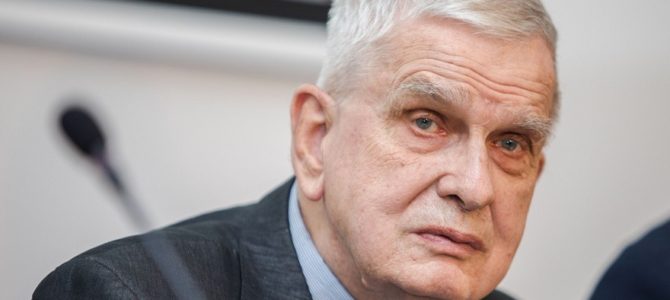by Gabija Strumylaitė, 15min.lt
After spending forty years in exile, the professor returned to Vilnius in 2018; here he actively participates in Lithuanian cultural life and courageously expresses his opinion on topics important to the country and the world. The website 15min.lt spoke with Tomas Venclova about the meaning of independence, principles of liberalism, historical memory, ethnic minorities and other issues.
This year has also been named the Year of the Vilna Gaon and of Litvak History. What do you think, do Lithuanians understand and appreciate sufficiently the Jewish legacy? What should we be doing to honor these people? Do we need, for example, to rebuild the Great Synagogue, or establish a modern museum of Jewish history?
In this regard I think we are doing better compared to the situation over ten years ago, never mind earlier periods. I’m not just thinking about Jewish affairs, but those of other ethnic minorities as well: Poles, Russians, Belarussians, Karaïtes, Tartars.
There is a large amount of latent distrust of minorities in Lithuania overall. I will mention another minority about which there has been a lot of concern lately: the Roma. The great majority of the Lithuanian public are prejudiced against them, and this is senseless and unnecessary, and needs to be corrected.
And with the Poles as well. “The Poles will never let go of Vilnius and absolutely will try to get it back,” we could say that’s sort of the general folk wisdom. The great majority of people believe this and, unfortunately, today’s Poland is providing a basis for this: there are right-wing extremist protests and parades in Warsaw where they speak loudly of Vilnius and Lvov.
We have very few Jews today. Although there are important and influential people among them. Sometimes it’s difficult to say whether someone should really be called Jewish, sometimes it seems as if the individual is a Lithuanian of Jewish descent. Leonidas Donskis was one such person. Unfortunately he is no longer with us. Irena Veisaitė is such a person as well. If you think about it, you can think of at least several more.
Without discussing Jews, we cannot talk objectively about our history.
All of these people have a positive effect on our culture and daily life, but there aren’t many of them. Incomparably more perished during World War II. You could say the very face of Lithuania has changed because of this.
Full interview in Lithuanian here.


